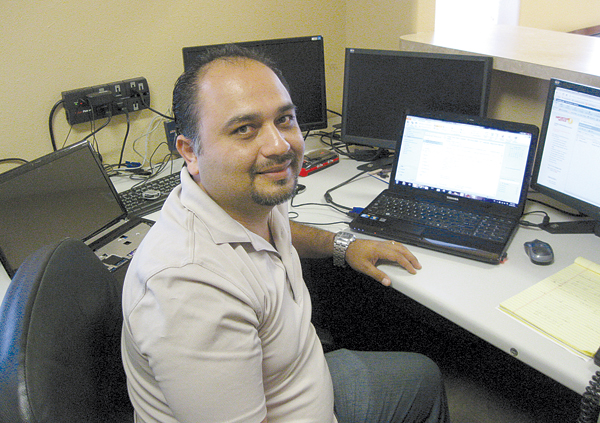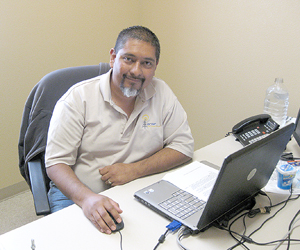- La Feria Community Holds Succesful Business Mixer Event
- Little Nashville to Take Place in Downtown Mercedes
- Lions Basketball Captures District Gold
- La Feria ISD Students Compete in Regional Chess Tournament
- Lions End First Half of 32-4A on a High Note
- La Feria ISD Held Another Successful Parent Conference
- Strong Appearance for Lions at Hidalgo Power Meet
- LFECHS Students Get to Meet Local Actress
- Students Participate in Marine Biology Camp
- Two LFECHS Students Qualify for All-State Band
Is There a Hacker in Your Future?
- Updated: November 8, 2013
There are Ways to Prevent It
As computer designers find new ways for us to utilize and access the Worldwide Web, another equally determined band of programmers is developing creative new ways to commit crime and chaos on-line.
Thus, we have a new breed of criminal–the cyber criminal. Old-timers will tell you that things aren’t what they used to be, and they are right. Time was when a crook would rob you wearing a bandana and toting a six-shooter. 21st Century bandits do it clandestinely with the click of a computer key, perhaps a continent away. These attacks are becoming ever more clever and sophisticated.

Abid Castaneda, Computer Systems Analyst. Photo: Bill Keltner/LFN.
These new scofflaws are the ever present, domestic and international hackers, a term used to describe hostile, malicious intervention by individuals who commit their mischief on unsuspecting Internet users who may not even be aware that they are targets of such worldwide destruction, or those who think their security firewall is secure–Silly thinking!
To learn what we can do to protect ourselves, we called on Richard Galvan, a computer expert and owner of Orbit Broadband in Mercedes. Richard has 22 years of experience.

Michael Rojas, Senior Network Engineer.
He and his staff of computer wizards know what havoc malicious international hackers can stir up, and also, what steps you can take now to prevent an unwelcome encounter with a determined hacker in your near or current future. It could be happening now as you read on.
Abid Castaneda is the Systems Analyst at Orbit Broadband. He works closely with Michael Rojas, Senior Network Engineer. Together with Richard Galvan, this team of experts has assembled 12 preventative measures that could protect and save you from incalculable loss:
- First of all, always update Windows (windowsupdate.microsoft.com) and install all critical patches. You can find tutorial guidance to update Windows here.
- Run and update your virus signature files every time you use it.
- Read a website’s privacy statement and software license agreements. These provide you with clues to any misuse of your personal information when using these sites or about programs you download.
- Don’t open on email attachments or mail messages that come from an unknown source.
- Try not to install P2P programs such as Napster, Kazaa, ChanCast, or any software from an unknown source. The former will turn your computer into a server, and the latter may contain trojans and viruses.
- Turn off your hard disk C:\ drive sharing If you must share a disk/drive, make sure it requires a password. Otherwise, anyone in the Internet can use your computer to back up their files without your knowledge.
- If you can’t close a pop-up window, never click OK, Agree, or Close inside the body of the window. Only close the window by clicking the X in the top-right corner of the window.
- Put a good password on your PC. If you have a password on your PC that is easy to guess, your computer can be easily taken over by hackers.
- Windows PCs with static IP addresses are especially easy targets. You should always set “Obtain an IP address automatically” in Windows unless you are running a server, and you are knowledgeable in computer security.
- Only download files or programs from websites you trust.
- Use unique passwords on every site, always use a mix of numbers, upper case and lower case letters.
- Restrict credit card information. Everyone seems to want to keep your credit card information close, all the better to get you to spend money. Using a different credit card per account would be great, except no one has that many available. So, say “no” when sites want to store your card number. And, if a site insists on storing the number, then delete it after every order.
The message is: There is a war going on out there. Richard Galvan and his computer wizards have now provided you with some timely defensive armor: Strap it on and sally forth to face the foe, who may be in your neighborhood or a continent away.
Remember: Eternal vigilance is the price of effective protection. One truth is clear, Hackers will always be a step ahead; so, who is secure?
Got a question? Call Abid at (956) 565-9222.

Orbit Broadband Computer Center in Mercedes.


